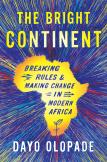Helping The Poor Prosper
Twice this year, in separate assignments to Africa, I have been confronted with the issue of generational leadership.
In South Sudan, there was hardly a person I spoke to who didn’t feel that their national leaders had let them down. Hopes for the world’s youngest country—only three years old—have been dashed because a long-standing political conflict between President Salva Kiir and his former vice president, Riek Machar, accused by Kiir of plotting an attempted coup. Their conflict turned ugly, prompting violence that spawned ethnic tensions and escalated into a serious humanitarian and political crisis that has yet to be fully resolved.
The basic complaint I heard was this: both leaders—in their early 60s and veterans of South Sudan’s protracted war of independence from Sudan—were playing the type of old-style (and bloody) power games that South Sudan had come to expect from their former overseers in Khartoum. The sense of frustration and world-weariness was most acute among women, who seemed particularly frustrated about shouldering the civilian fallout from yet another war between men.
The other moment came during an assignment in Uganda, when I asked a young medical worker in his 20s about his take on Uganda’s Anti-Homosexuality Act (since overturned by the nation’s constitutional court). He framed it as a generational issue: whatever their feelings about homosexuality (and some were uncomfortable with it), he and others his age were generally embarrassed by the legislation, which had called for life sentences for those found guilty of “homosexual acts.”
The older generation (which dominates Uganda’s national parliament) had passed a law that the medical worker and others felt had not lined up with their growing sense of cosmopolitan values. The worker even used the term “more civilized” to describe his generation’s outlook in contrast to an older group that is often seen as corrupt, not particularly nimble and loath to accept new ideas.
In their separate ways, William Easterly, a veteran economist at New York University, and Dayo Olopade, a young Nigerian-American journalist, would recognize this young man, as well as the reaction to the ongoing conflict in South Sudan, for what they are: signs of a changing continent, and changing from the grass-roots up. Both authors have written fine—though very different—books that explore some of the themes undergirding these changes.
First, Easterly’s book, in which Africa plays a prominent, though not the only, role. The Tyranny of Experts is a “big-think” volume in which economics, global history (with stops along the way not only in Africa, but in Latin America, Asia and the United States) and philosophical debates all get a hearing. And to what end? Easterly, a well-known figure in development studies circles, argues that since the end of World War II, the world has yet to debate fully what “development” really means.
“The conventional approach to economic development, to making poor countries rich, is based on a technocratic illusion: the belief that poverty is a purely technical problem amenable to such technical solutions as fertilizers, antibiotics, or nutritional supplements,” Easterly writes. This technical illusion has led to a situation Easterly calls “authoritarian development.” By that he means autocrats, perhaps even well-intentioned ones but autocrats nonetheless, are being advised and tacitly supported by key humanitarian players, including the World Bank and the Gates Foundation, two of the groups Easterly names critically as disrespecting the poor.
In one of the most vivid examples Easterly cites, the World Bank promoted and financed a 2010 forestation project in Uganda that uprooted 20,000 farmers at gunpoint from their homesteads. In the case of the Gates Foundation, a relatively new but powerful player in global efforts to improve childhood health, Easterly cites the foundation’s cozying up to Ethiopia’s authoritarian government because of the government’s goal-based, numbers-driven campaign to lower child mortality.
“The sleight of hand that focuses on technical solutions while covering up violations of the rights of real people is the moral tragedy of development today,” Easterly argues in what some would say is an unfair and overly polemical attack on groups and foundations “doing good.” Put another way, the absence of political and economic rights for the poor, Easterly says, is not an issue at the sidelines—it is the actual cause of poverty itself. “The dictator who the experts expect will accomplish the technical fixes to technical problems is not the solution; he is the problem.”
Authoritarian governments make troublesome appearances in The Bright Continent and, in some essentials, both authors make similar arguments. But in Olopade’s telling of the story, African governments are viewed by Africans much as my medical worker acquaintance views them: as flat-footed anachronisms that are hopelessly out of step, particularly with Africa’s young people. They are best ignored.
If Easterly’s is a provocative traverse of history and philosophy, Olopade’s book has to it a sense of discovery and almost contagious optimism—though the optimism sometimes overlooks the reality that states and governments aren’t going away and, as in the case of South Sudan or Uganda, can’t always be dismissed. Governments can still produce mischief. Or much worse.
Still, Olopade’s belief that many in Africa simply work around inefficient and corrupt governments is winning. “Look,” she almost seems to be saying to the reader, “This is Africa today. It is an exciting and dynamic place, and I am eager to be sharing this news with you.” Certainly The Bright Continent can help counter what Olopade describes as “the depressing top-level narratives that have held the region back.” (And about which there is already a mountain of literature.)
Sharing Easterly’s suspicion of experts and governments, Olopade writes that one of the problems of the world’s view of Africa has been “a preference for interactions between governments, or between formal institutions, when the most vibrant, authentic, and economically significant interactions are between individuals and decentralized groups.”
Anyone who has traveled to Africa in recent years will recognize some of these changes and the kind of excitement Olopade chronicles. Some of that is due to technological change—a continent whose land-line telephone service was often poor or nonexistent has embraced the cellphone and Internet service in all corners, among rich and poor, urban resident and villager alike.
Olopade makes much of the concept of kanju, a term she defines as the act of creativity, or improvision, that emerges from the difficulties of the African context. In one notable example, a group of African computer programmers transformed old, low-frills computer monitors—so-called “castoffs” no one in the West wanted—into usable “up-cycled” hardware for use in hospitals and clinics throughout Malawi. Kanju transformed junk into life-saving equipment.
In the realm of entertainment, Olopade cites the case of Kenneth Nnebue, a one-time electronics dealer in Nigeria who, with thousands of empty VHS tapes on his hands, began making films with his friends. The b-grade films proved popular beyond measure and helped create Nollywood, the film industry that produces the second largest number of films in the world after India’s Bollywood. (“The N stands for Nigeria,” Olopade patiently explains. “It’s hard to believe that many millions of people haven’t heard of Nollywood.” I have to confess I hadn’t until I read Olopade’s book.)
Olopade makes no excuses for her enthusiasms. “It may be easy to read this book as a libertarian celebration of hustling, hacking, and free-form development in sub-Saharan Africa. And it is,” she writes. And that is the way it has to be, she argues, as necessities like “health care, electricity, and education flourish outside the reach of the African state—and even roads and sanitation are increasingly the province of private ambition.” (In my travels, it’s been hard to miss the role Chinese are playing in building up Africa’s infrastructure.)
In short: “Public institutions are not maturing at the pace the region deserves.”
Olopade is right. But the unanswered question here is: O.K., now what? Though optimistic, Olopade knows there are still major obstacles ahead for the “bright continent,” a fact borne out by some of Africa’s still-grim educational statistics. In Malawi, the average size of a first-grade class is 100 students. Of those, 7 out of 10 won’t make it past primary school, the author notes. And in Kenya, she writes, 3 out of 10 third-graders still cannot read at a second-grade level.
African youth, Olopade argues, “are ready to go” and embrace the future. But in order to do that, they need education “grounded in risk-taking and rejection of conventional pedagogy.” Absolutely. But can kanju do that alone? I’m not sure. But I hope so.
This article also appeared in print, under the headline “Helping The Poor Prosper,” in the March 16, 2015, issue.









